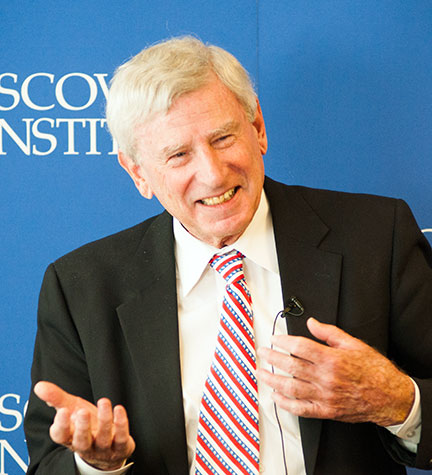Donald Devine
TFAS Senior Scholar

Donald Devine is senior scholar at The Fund for American Studies in Washington, D.C. He served as President Ronald Reagan’s civil service director during the president’s first term in office. During that time, The Washington Post labeled him “Reagan’s Terrible Swift Sword of the Civil Service” for cutting bureaucratic excesses and reducing billions in spending.
Before and after his government service, Devine was an academic, teaching 14 years as associate professor of government and politics at the University of Maryland and for a decade as a professor of Western civilization at Bellevue University. In the definitive work on Frank Meyer’s essays, Devine was listed as one of the dozen “leading lights” of the postwar fusionist reevaluation of conservative and libertarian thinking.
He is a columnist appearing regularly in The American Spectator, The Imaginative Conservative and Law & Liberty and is the author of 11 books, including his most recent, “Ronald Reagan’s Enduring Principles: How They Can Promote Political Success Today” and “The Enduring Tension: Capitalism and the Moral Order.”
Today, Devine writes and teaches young people, speaking about reviving the Constitution and what Reagan called the secret of its success: the way it harmonized freedom and tradition in its fragile balance called federalism.
To learn more about Devine’s lectures and seminars, please visit the links below:
To book Dr. Devine to speak to your campus or organization, please contact TFAS Special Events Director Jane Mack at jmack@TFAS.org.
251
oped
The American Spectator - 2.24.25
Now the Hard Part: Defense, Intelligence, FBI, and Trump’s War on the Status Quo
Entrepreneur Elon Musk, his White House Department of Government Efficiency (DOGE), and his staff in key management agencies have effectively taken control of domestic agencies’ agenda — reviewing them for elimination, cuts, or reforms, mostly supported by President Donald Trump’s base voters.
The American Spectator - 11.22.24
Controversial Appointees, Clay Pigeons, and Successful Governmental Politics
When did conservatives last hear such widespread media opposition to a president nominating “unqualified, extreme, and controversial” appointees to high government positions? As a past Ronald Reagan Office of Personnel Management nominee, I can attest to the fact that he was rebuked as strongly as Donald Trump is today, including by old regime Republicans.
Law & Liberty - 10.21.24
Facing Economic Realities
Every campaign season, candidates from both parties unveil wildly optimistic promises for economic growth and universal prosperity. The 2024 election is no different—both Donald Trump and Kamala Harris have put forward politically popular proposals to combat inflation by increasing federal deficits.
The American Spectator - 10.1.24
What Cracked Up Conservatism in the 1990s, and What Can Recover It Today?
Left-wing journalist John Ganz has written a new book, When the Clock Broke: Con Men, Conspiracists, and How America Cracked Up in the Early Nineties, to answer the question we all want to know: “How did we get to today’s sour politics?” He blames it on the Right, and, for this, he has received wide praise in today’s mainstream media and even receiving some limited respect from the Right.
The American Spectator - 7.10.24
Teaching the Constitution in a World Without Books
An important conservative intellectual was here teaching an attentive post-graduate audience about the contributions of a dozen intellectual leaders of the early conservative movement. But it soon became obvious from the questions posed to him that the students were confused.



